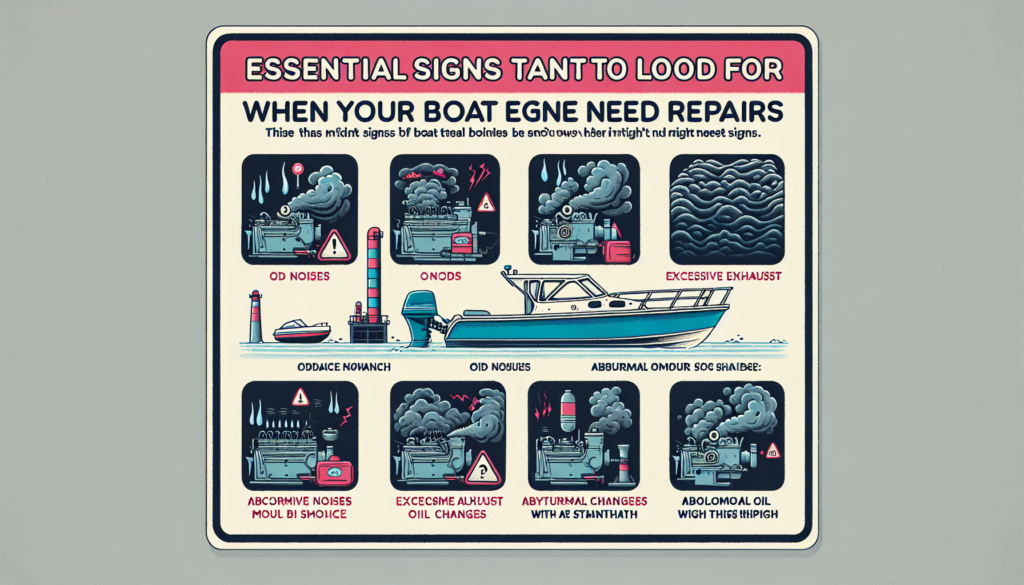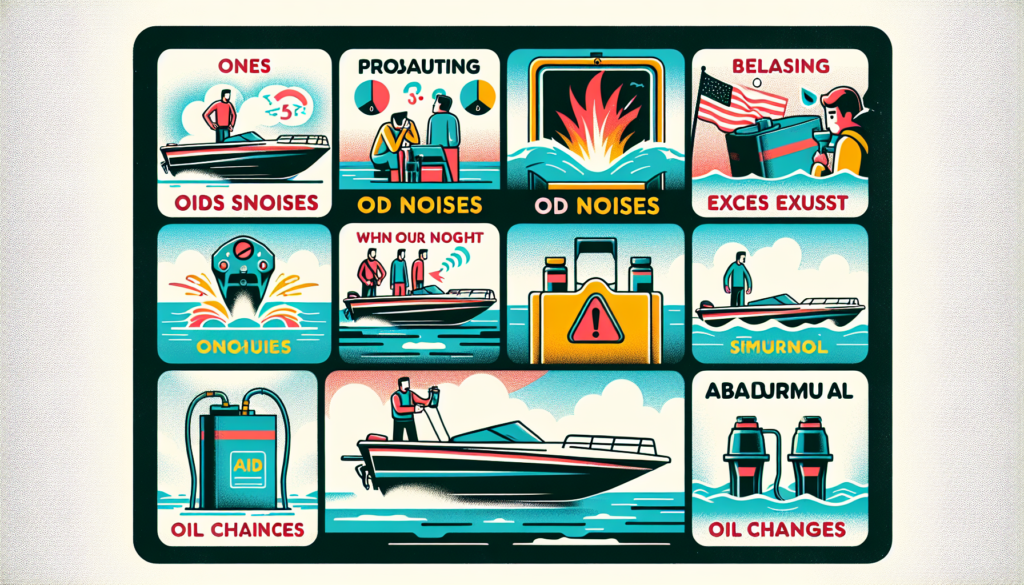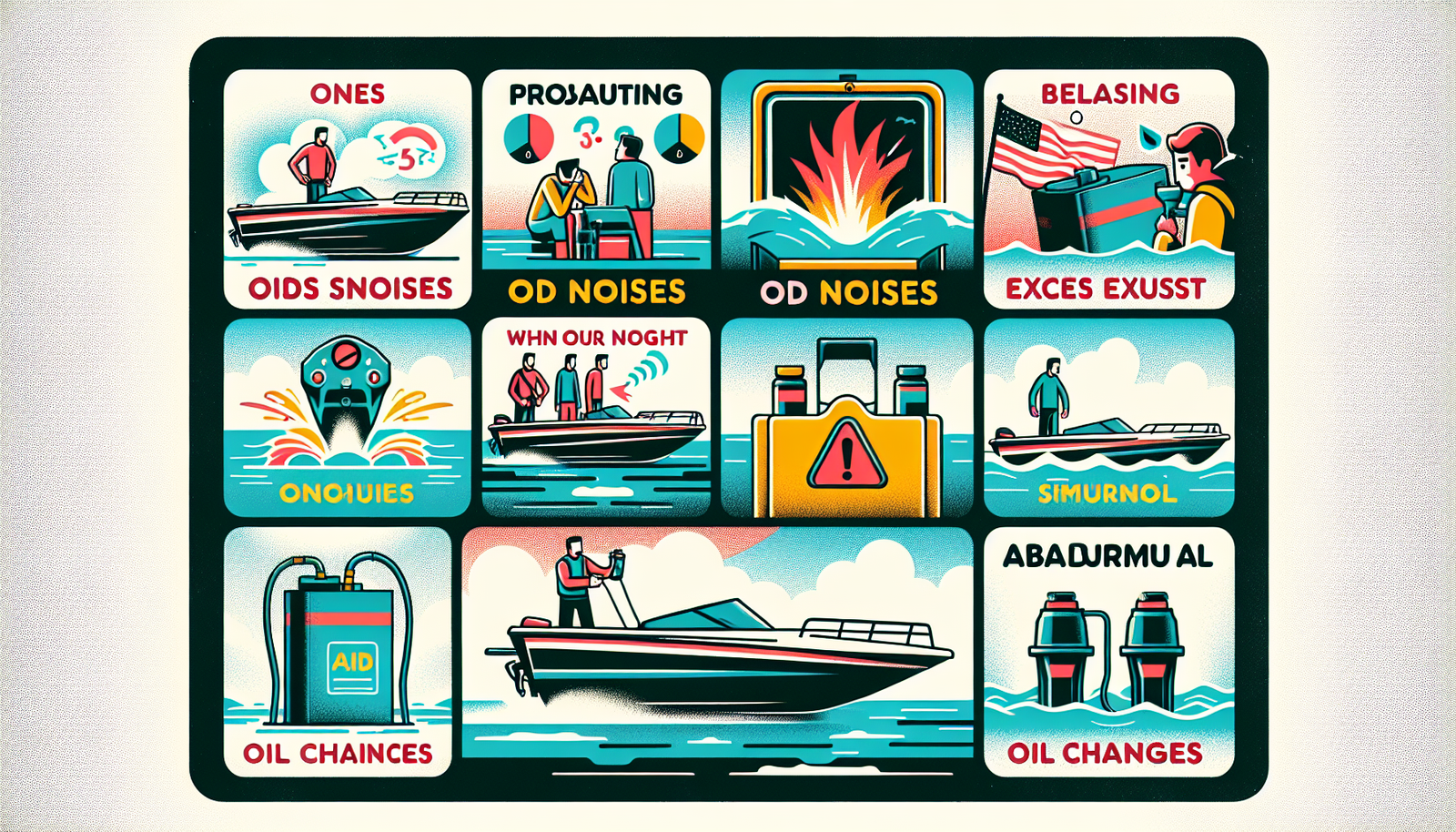If you’re a boat owner, knowing when your vessel needs engine repairs is a crucial part of maintaining its functionality and longevity. In the article “How To Tell When Your Boat Engine Needs Repairs”, you’ll get a comprehensive understanding of the key signals that indicate your boat engine needs attention, from strange noises to poor fuel economy. By being aware of this guidance, you’ll be better equipped to maintain your boat’s engine health and avoid potential issues before they escalate into more serious, costlier problems.

Understanding Different Boat Engines
In the world of boating, the engine is the heart that keeps everything moving. There are different boat engines categorized into two main types, outboard and inboard engines, each with distinct features.
Introduction to Outboard Engines
Outboard engines are the most common type of boat engine you’ll come across. You’ve likely seen these as the external engine hanging off the back of smaller boats. They’re versatile, user-friendly, and offer easy access for maintenance and repairs due to their location on the hull. They also free up space within the boat as most of the engine system components are found in the powerhead at the rear of the boat.
Introduction to Inboard Engines
Unlike outboard engines, which hang off the stern, inboard engines sit inside the boat’s hull, typically midship. They’re most commonly found on larger boats and are more suited for heavy-duty activities. Inboard engines offer excellent maneuverability tending to give a boat great stability due to the lower center of gravity, but may be more challenging for do-it-yourself maintenance as their location can make accessibility tricky.
Benefits and Downsides of Each Type
With outboard engines, versatility is a key advantage. They’re lightweight, easy to handle, and tend to be more fuel-efficient. However, they may lack the horsepower needed for larger boats. On the other hand, inboard engines offer more power and improved handling, especially in rough water. They’re best for long-range, high-speed cruising, but they tend to consume more fuel and regular maintenance can be more demanding.
Regular Maintenance of Boat Engine
Just as care and attention are given to the external features of a boat, so too should the engine experience routine love and care.
The Importance of Regular Check-ups
A boat’s engine is its lifeline. Regular check-ups and maintenance not only prolong the life of the engine but also improve its operation and efficiency. Preventive care can save you from expensive repair or replacement costs in the future and is crucial for the safe operation of your boat.
Consequences of Not Conducting Regular Maintenance
Skipping regular boat engine maintenance can lead to poor performance, increased fuel consumption, and potential engine failures. In worst-case scenarios, it could even lead to a completely unusable engine. Poor maintenance could also devalue your boat if you plan on reselling it in the future.
Basic Tools Needed in Engine Maintenance
Proper engine maintenance should involve specific tools to ensure thorough checks and repairs. Some fundamental tools you should have include screwdrivers, wrench sets, pliers, grease gun, oil extractor pump, spark plug socket, and cleaning supplies.
Early Signs of a Damaged Boat Engine
A keen eye and an understanding of boat engines can save you from a lot of trouble. Understanding the early signs of a damaged boat engine can prevent small issues from becoming significant problems.
Decreased Performance on the Water
One of the earliest signs of a problem is a decrease in performance. This is typically experienced as slower speeds, difficulty steering, or less responsive handling.
Unusual Smells from the Engine
Unusual smells from the engine can indicate a variety of issues. A burnt smell may signal overheating, while a gas-like smell could mean a possible fuel leak.
Increased Fuel Consumption
If you notice that your boat is consuming more fuel than usual, it could point to an engine issue. When the engine isn’t functioning optimally, it tends to burn more fuel to deliver the required performance.
Engine Taking Longer to Start
Difficulty in starting isn’t just frustrating; it can indicate a problem with your engine. If the engine takes longer to start or requires multiple attempts, a thorough check should be in order.

Physical Signs of Engine Damage
Visible and physical signs on the engine can be telling. They often indicate deeper issues that need immediate attention.
Visible Damages on the Engine
Cracks, rust, or discoloration on the engine or parts are clear signs of damage. Regular inspection can help spot these issues early, preventing further damage to the engine.
Presence of Unidentified Parts or Shavings
If you find unidentified parts or shavings in the engine compartment, it’s a clear sign that something is amiss. These could be parts that have broken off, indicating a potential mechanical failure.
Leaks in the Engine
Leaks or pools of fluid beneath the engine should raise immediate concern. Whether it’s fuel, oil, or coolant, leaks can lead to serious engine damage if not addressed quickly.
Engine Noises and What They Mean
Engine noises are another crucial area to pay attention to. Unusual sounds can indicate a variety of issues with your boat engine.
Identifying Different Engine Noises
Boat engines will make some noise, but the key is knowing what’s normal and what isn’t. Get familiar with how your engine sounds and operates when it’s in good condition to provide a baseline for determining abnormalities.
Normal Engine Sounds vs Unusual Noises
Normal engine sounds are usually an even hum or roar. Unusual noises, however, can include knocking, whining, sputtering, or grinding. Each sound can point to a different issue, from minor adjustments needed to potential major repairs.
Possible Engine Issues Related to Specific Noises
Knocking might mean issues with the fuel injector or parts wearing out. Whining could be a sign of transmission issues, while a grinding noise may mean a problem with your bearings or gear.
Boat’s Electrical System and Engine Health
Your boat’s electrical system plays a critical role in the overall health of your boat’s engine.
Importance of the Electrical System
The electrical system powers many crucial components of the boat, from the engine’s ignition system to the bilge pumps, lights, and navigation systems. A well-functioning electrical system ensures these parts and systems run smoothly, contributing to the boat’s overall performance.
How Electrical Problems can Indicate Engine Issues
Faults in the electrical system can lead to engine issues. For instance, if the ignition system has a problem, starting the engine may become difficult. Likewise, a malfunctioning alternator can result in poor battery performance and, in turn, affect the functioning of your engine.
Signs of Electrical System Problems
Signs of electrical system problems can include trouble starting the engine, flickering lights, or failing electronics on board. Frequent battery drain or unresponsive electric components also hint at a possible issue with your electrical system.
Understanding Engine Temperature Problems
The engine temperature plays an essential role in the functioning of your boat engine.
How Temperature Affects Your Boat Engine
The internal combustion process generates heat in the engine. Proper operating temperature is crucial for an engine’s efficiency. It ensures the fuel burns at the optimal rate and maintains the viscosity of the engine oil.
Possible Problems when Overheating Occurs
Overheating can lead to several issues, including engine damage, reduced performance, and premature wear. It’s critical to monitor the engine’s temperature and address any overheating promptly to avoid these problems.
Signs Your Engine May Be Overheating
Specific symptoms can signal an overheating engine. These include a higher than normal temperature gauge reading, the engine warning light turning on, poor performance, or the presence of smoke or steam.
Issues with Boat Engine’s Cooling System
The cooling system plays a crucial role in maintaining your boat engine’s proper operating temperature.
Components of Boat’s Cooling System
Key components of the cooling system include the water pump, the thermostat, and the heat exchanger. Together they help disperse heat from the engine to prevent overheating.
Common Problems with Cooling Systems
Some of the most common cooling system issues involve a faulty water pump, a stuck thermostat, or a clogged heat exchanger. Each of these can contribute to engine overheating.
Signs of a Faulty Cooling System
Signs of a failing cooling system can include the engine running hot, reduced engine performance, or coolant leaks. If you notice any of these signs, it’s best to get the system checked and repaired promptly.
Boat Vibration and Its Effects on the Engine
Excessive vibration can be a sign of potential engine issues.
Causes of Excessive Boat Vibration
Excessive boat vibration can be caused by several factors. Propeller issues, engine alignment problems, or loose or worn engine mounts can all contribute to abnormal vibrations.
How Vibration Indicate Engine Issues
Unusual or increased vibration can indicate mechanical issues with the engine. If left unaddressed, these vibrations can result in wear and tear on the engine, leading to further damage.
Steps to Reduce Vibration
Reducing vibration involves diagnosing the root cause. It might require propeller repair or replacement, engine alignment, or fixing the engine mounts. Regular preventative maintenance can also help prevent excessive vibration.
When to Consult with a Professional
While regular maintenance is crucial and some repairs can be done alone, certain situations call for a professional’s touch.
Assessing Your Ability to Repair
Not everyone is a DIY pro, and it’s important to recognize when a repair is beyond your skills. Attempting a repair yourself without the proper knowledge or tools can result in additional damage or further complications.
Benefits of Professional Repair Services
Professional boat repair services have experienced technicians who have dealt with a variety of engine issues. They can diagnose and resolve issues quickly and effectively and can even spot potential problems you may have missed.
Choosing a Reliable Boat Repair Service
When choosing a boat repair service, check for qualifications, experience, and customer reviews. A professional, reliable service will be transparent about cost, timing, and necessary repairs, making your boating experience a smooth sail.

